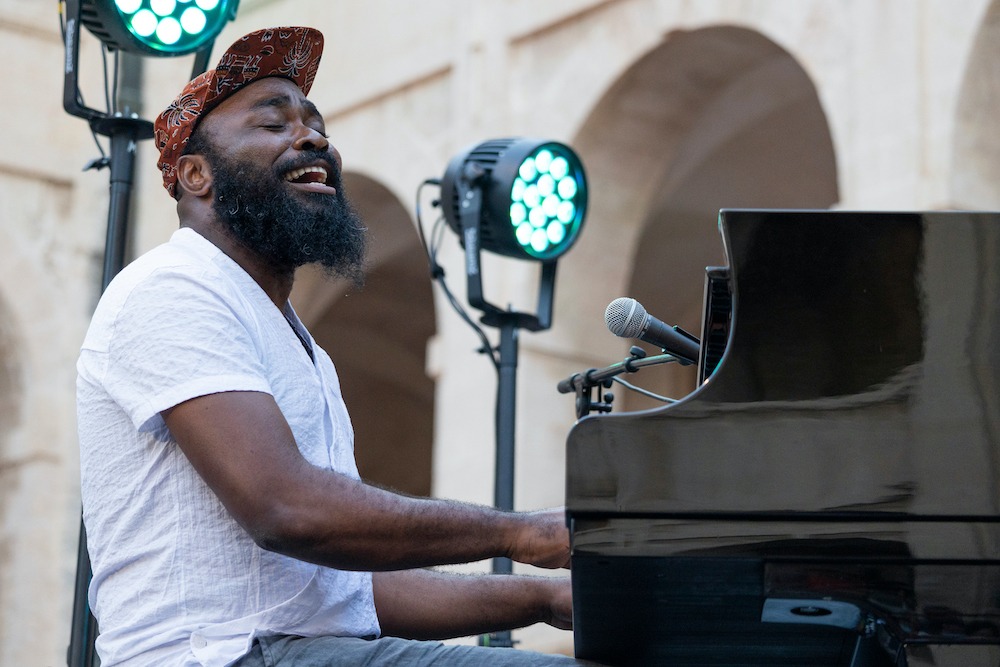At thirty-four, Nduduzo Makhathini is now established in the firmament of world jazz through his consummate art of transmitting his original Zulu culture. Pianist, singer, composer, conductor, teacher and more, he deploys music whose emotional force conquers audiences on all continents. His latest album, “In The Spirit of Ntu” is a baroque edifice in the colors of a “rainbow country” that would have become universal. He delivered pieces of it during his concerts at the head of a new quartet.
- Nduduzo Makhathini in Marseille (c) Clara Lafuente
– How is your European tour going?
It’s a celebration of cultures, if only by the composition of the group. With a Cuban drummer, Francisco Melaan American saxophonist, Logan Richardsonand two South Africans, the bassist Zwelakhe Duma Bell The Father and myself, it’s a transatlantic story. Displacements from such different origins, in various places, imply displacements of languages, in particular musical ones. These are new spiritual encounters each time. I can’t help but think of the tragic founding displacement that was the slave trade: the deported slaves were forced to forget what made up their culture. However, something magical happened: the music, which is the memory of the continent from which they came. And now, when we think about this connection between Africa and America, we are still the heirs of this displacement, in particular because, musically, we still use the pentatonic scale that the former slaves took with them. I like to think that our tour fits, modestly, into this story of collective memory. Admittedly, we cannot correct the brutalities of the past, but it seems to me that European audiences are very open to receiving our message. Racial barriers certainly exist, but through my tours in Europe, I am certain that we can find ways of a dialogue of consciences, if only by seeing each other from person to person. In my mother tongue, we say “sambona”, which means “I see you”. Beyond colonialism, apartheid, racism, I believe that it is possible to propose “pluriverses” which would respect our diversities, rather than a single universe which would be subject to the laws of a globality.
– Beyond spirituality, is there an invitation to dance in your music?
In African communities, particularly in the Bantu zone of expression, music is not separated from other everyday expressions. We speak of “N’goma”: it is what would correspond to the music but it is also the dance, the breath, the prophetic knowledge, the truth… When a person speaks of “N’goma”, these are all of these things at once. My last album, “In the Spirit of Ntu”, speaks of this totality which impregnates me in my musical work: I am constantly immersed in spiritual knowledge. Basically, I’m an improviser, in the here and now. Improvising is to open up other worlds to us. We believe that music is a legacy of our ancestors and improvising is a way to still be possessed by their spirits, to pay homage to them by having them with us.
– How do you integrate your cultural roots into your piano playing?
I started the piano when I was seventeen, quite late then. At the same time as jazz, which I realized had many similarities with the traditional repertoire of my people, in which I already had a background. Jazz allowed me to deploy this culture in the direction of other universes. Whether singing, percussion or flutes, I participated in ceremonies since my childhood, for births as for deaths, for weddings. I was then sufficiently mature to integrate these aspects into my piano playing and into my compositions. Since 2014, I have released ten albums involving my cultural identity, always asking myself this question of playing an instrument foreign to my original language. It’s a bit the same thing with my singing. All of this is part of the same social and cultural process, the “N’goma”. I try to ensure that dance, singing, piano, find a common home in my artistic practice which is jazz. It is a constant questioning.

- Nduduzo Makhatini & Logan Rocharson in Marseille (c) Clara Lafuente
– How do you see your role as artistic director of Blue Note Africa? Does it complement your work as a teacher?
The label was launched in 2019. It seemed important to me to create a space for my community to give back what I was given. I don’t necessarily try to integrate my students into it, although it may offer them prospects. I try to encourage them to play organically, without considering a record production because it really takes years of learning before thinking about it.

